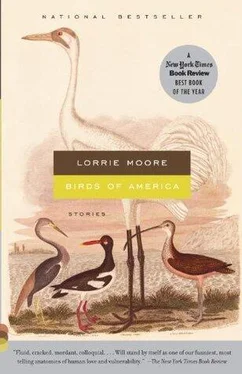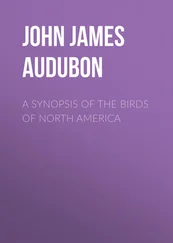“Simone used to be married to someone in Soda Springs, Idaho,” Cal says to me.
“You’re kidding!” I say.
“Oh, it was very brief,” she says. “He was ridiculous. I got rid of him after about six months. Supposedly, he went off and killed himself.” She smiles at me impishly.
“Who killed himself?” asks Eugene. He has swallowed all the pills but one.
“Mommy’s first husband,” says Cal.
“Why did he kill himself?” Eugene is staring at the middle of the table, trying to think about this.
“Eugene, you’ve lived with your mother for seven years now, and you don’t know why someone close to her would want to kill himself?” Simone and Cal look straight across at each other and laugh brightly.
Eugene smiles in an abbreviated and vague way. He understands this is his parents’ joke, but he doesn’t like or get it. He is bothered they have turned his serious inquiry into a casual laugh. He wants information! But now, instead, he just digs into the duck, poking and looking.
Simone asks about the school visits. What am I finding? Are people nice to me? What is my life like back home? Am I married?
“I’m not married,” I say.
“But you and Patrick are still together, aren’t you?” Cal says in a concerned way.
“Uh, no. We broke up.”
“You broke up?” Cal puts his fork down.
“Yes,” I say, sighing.
“Gee, I thought you guys would never break up!” he says in a genuinely flabbergasted tone.
“Really?” I find this reassuring somehow, that my relationship at least looked good from the outside, at least to someone.
“Well, not really ,” admits Cal. “Actually, I thought you guys would break up long ago.”
“Oh,” I say.
“So you could marry her?” says the amazing Eugene to his father, and we all laugh loudly, pour more wine into glasses, and hide our faces in them.
“The thing to remember about love affairs,” says Simone, “is that they are all like having raccoons in your chimney.”
“Oh, not the raccoon story,” groans Cal.
“Yes! The raccoons!” cries Eugene.
I’m sawing at my duck.
“We have raccoons sometimes in our chimney,” explains Simone.
“Hmmm,” I say, not surprised.
“And once we tried to smoke them out. We lit a fire, knowing they were there, but we hoped that the smoke would cause them to scurry out the top and never come back. Instead, they caught on fire and came crashing down into our living room, all charred and in flames and running madly around until they dropped dead.” Simone swallows some wine. “Love affairs are like that,” she says. “They all are like that.”
I’m confused. I glance up at the light, an old brass octopus of a chandelier. All I can think of is how Patrick said, when he left, fed up with my “selfishness,” that if I were worried about staying on alone at the lake house, with its squirrels and call girl-style lamps, I should just rent the place out — perhaps to a nice lesbian couple like myself.
But Eugene, across from me, nods enthusiastically, looks pleased. He’s heard the raccoon story before and likes it. Once again, it’s been told right, with flames and gore.
Now there is salad, which we pick and tear at like crows. Afterward, we gaze upon the bowl of fruit at the center of the table, lazily pick a few grapes off their stems. We sip hot tea that Cal brings in from the kitchen. We sip until it’s cool, and then until it’s gone. Already the time is ten o’clock.
“Dance time, dance time!” says Eugene when we’re through. Every night, before bed, they all go out into the living room and dance until Eugene is tired and falls asleep on the sofa. Then they carry him upstairs and tuck him in.
He comes over to my chair and takes my hand, leads me out into the living room.
“What music shall we dance to?” I ask.
“You choose,” he says, and leads me to the shelf where they keep their compact discs. Perhaps there is some Stravinsky. Perhaps Petrouchka , with its rousing salute to Shrovetide.
“Will you come see me tomorrow when you visit the fourth graders?” he asks as I’m looking through the selection. Too much Joan Baez. Too much Mahler. “I’m in room one oh four,” he says. “When you visit the fourth graders, you can just stop by my classroom and wave to me from the door. I sit between the bulletin board and the window.”
“Sure!” I say, not knowing that, in a rush, I will forget, and that I’ll be on the plane home already, leafing through some inane airline magazine, before I remember that I forgot to do it. “Look,” I say, finding a Kenny Loggins disc. It has the song he heard earlier, the one from the video. “Let’s play this.”
“Goody,” he says. “Mom! Dad! Come on!”
“All right, Eugenie-boy,” says Cal, coming in from the dining room. Simone is behind him.
“I’m Mercury, I’m Neptune, now I’m Pluto so far away,” says Eugene, dashing around the room, making up his own dance.
“They’re doing the planets in school,” says Simone.
“Yes,” says Eugene. “We’re doing the planets!”
“And which planet,” I ask him, “do you think is the most interesting?” Mars, with its canals? Saturn, with its rings?
Eugene stands still, looks at me thoughtfully, solemnly. “Earth, of course,” he says.
Cal laughs. “Well, that’s the right answer!”
“This is it!” sings Kenny Loggins. “This is it!” We make a phalanx and march, strut, slide to the music. We crouch, move backward, then burst forward again. We’re aiming to create the mildewy, resinous sweat smell of dance, the parsed, repeated movement. Cal and Simone are into it. They jiggle and link arms. “This is it!” In the middle of the song, Eugene suddenly sits down to rest on the sofa, watching the grown-ups. Like the best dancers and audiences in the world, he is determined not to cough until the end.
“Come here, honey,” I say, going to him. I am thinking not only of my own body here, that unbeguilable, broken basket, that stiff meringue. I am not, Patrick, thinking only of myself, my lost troupe, my empty bed. I am thinking of the dancing body’s magnificent and ostentatious scorn. This is how we offer ourselves, enter heaven, enter speaking: we say with motion, in space, This is what life’s done so far down here; this is all and what and everything it’s managed — this body, these bodies, that body — so what do you think, Heaven? What do you fucking think?
“Stand next to me,” I say, and Eugene does, looking up at me with his orange warrior face. We step in place: knees up, knees down. Knees up, knees down. Dip-glide-slide. Dip-glide-slide. “This is it!” “This is it!” Then we go wild and fling our limbs to the sky.
When Olena was a little girl, she had called them lie-berries — a fibbing fruit, a story store — and now she had a job in one. She had originally wanted to teach English literature, but when she failed to warm to the graduate study of it, its french-fried theories — a vocabulary of arson! — she’d transferred to library school, where everyone was taught to take care of books, tenderly, as if they were dishes or dolls.
She had learned to read at an early age. Her parents, newly settled in Vermont from Tirgu Mures in Transylvania, were anxious that their daughter learn to speak English, to blend in with the community in a way they felt they probably never would, and so every Saturday they took her to the children’s section of the Rutland library and let her spend time with the librarian, who chose books for her and sometimes even read a page or two out loud, though there was a sign that said PLEASE BE QUIET BOYS AND GIRLS. No comma.
Читать дальше












